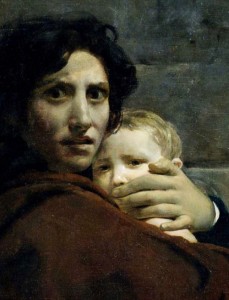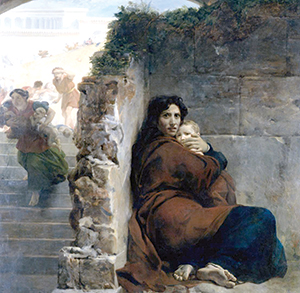Thus saith the Lord;
A voice was heard in Ramah, lamentation, and bitter weeping; Rachel weeping for her children refused to be comforted for her children, because they were not.
Jeremiah 31:15 and Matthew 2:18
During a sermon in the chapel of the Santa Marta residence in the Vatican, Pope Francis spoke of the coming Christmas season. The festivities, he told the congregation, will seem empty in a world which has chosen “war and hate” – God Himself, Jesus Himself, weeps.
Today Jesus weeps as well: because we have chosen the way of war, the way of hatred, the way of enmities. We are close to Christmas: there will be lights, there will be parties, bright trees, even Nativity scenes – all decked out – while the world continues to wage war. The world has not understood the way of peace.”
And more than this, “The men who work war, who make war, are cursed, they are criminals,” and he called the faithful to the way of peace and to “pray for conversion of heart.” We can understand why his words sound so downbeat, so despairing; but the world has never understood the way of peace. There is nothing new in this.
In the early years of Jesus’s life there was weeping, pain and grief; it was the world into which He was born, and in which he lived out his early years. As he was born the angels sang, “Glory to God in the highest, and on earth peace, good will toward men.”
And Rachel wept for her children.
The world into which He was born was brutal, immoral and power-hungry; and it was full of injustice, pain and grief. Just like the world today. Yet at His appearing, the angels sang, “Glory to God in the highest, and on earth peace, good will toward men.”
And we might ask, “How can this be?”
* * *
Herod the Great was no stranger to treachery, instability, murder and death; his life was full of it. When, in 38BC, and with the assistance of Mark Antony, 30,000 Roman infantrymen and 6,000 cavalry, he finally secured Jerusalem, he celebrated his achievement by slaughtering 45 of the 71 members of the Jewish Sanhedrin.[i]
 In an act of short term political and religious expediency he appointed his brother-in-law, Jonathan, as High Priest. Within a year, however, and aged only 18, Jonathan was found dead in one of the pleasure pools at Herod’s palace in Jericho. It was not an accident. His court was a whirl of intrigue and suspicion. Each faction of his complex and extended family vied against the other, the tensions leading to the death of his second wife, Mariamme. She had been accused of using magic against him, and, goaded by his sister Salome, he had her executed.
In an act of short term political and religious expediency he appointed his brother-in-law, Jonathan, as High Priest. Within a year, however, and aged only 18, Jonathan was found dead in one of the pleasure pools at Herod’s palace in Jericho. It was not an accident. His court was a whirl of intrigue and suspicion. Each faction of his complex and extended family vied against the other, the tensions leading to the death of his second wife, Mariamme. She had been accused of using magic against him, and, goaded by his sister Salome, he had her executed.
But even then her death almost drove him insane. “He shrieked for her around the palaces, ordered his servants to find her, and tried to distract himself with banquets.”[ii] Later, the Jewish Talmud would claim that “Herod preserved Mariamme’s body in honey, and this may have been true – for it was fittingly sweet, suitable macabre”.[iii]
After her death, her (and Herod’s) two sons Alexander and Aristobulos blamed their father, fomented further intrigue in the court and followed their mother to execution. In the process, Herod killed a further 300 army officers; they had, he was told, accepted bribes during the course of the trial.
And in the end, while dying a most grotesque death, his final order was “to command his troops to arrest thousands of notables from across the country and sequester them in a stadium in Jericho.”[iv] On the day of his own death they were to be killed; he knew that no-one would grieve for him. His 4orders, however, were disobeyed.
Herod the Great was no stranger to treachery, murder and death; his life was full of it. Indeed, in Dorothy Sayers series of plays, ‘The Man Born to be King’, even the Roman captain of Herod’s personal bodyguard was portrayed as more virtuous than he.
PROCLUS: Here, sir, with Captain Darius, to report everything quiet, sir.
HEROD: Good. Here’s another order. Take a band of my Thracians. Go to Bethlehem. Search out every male child in the cradle –
PROCLUS: Children, sir?
HEROD: From twelve days old – No. I don’t trust them. No. Take all the male children from two years old and under and put the lot to death. All of them. The whole brood of adders. Do you hear? Let none escape. Kill them all.
Herod was brutal and self-obsessed, and lived in a brutal and self-obsessed world; he was just the kind of man to order a slaughter of innocents. And at the heart of the Christmas story there is weeping, pain and grief.
At the heart of the Christian story there is the death of our children. And that is a sentence and a scene from which we should recoil.
And yet, at His appearing the angels sang, “Glory to God in the highest, and on earth peace, good will toward men.”
And we might wonder how this can be.
* * *
We might also wonder why Matthew chose to include this record in his Gospel. It seems incongruous, unseemly, almost, juxtaposed with the news of Immanuel, with the news of wise men and shepherds and worship, and “Fear not!”
As the Child of Heaven was born, the children of the earth were slaughtered; and the ‘festivities’ must have seemed empty:
Rachel weeping for her children, refused to be comforted for her children because they were not.”
The world has never understood the way of peace; the innocent have always suffered; and each generation has learned to weep.
But this is the reason He came.
He did not come to bring us bright lights, and trees, and Nativity scenes. The streets of Bethlehem did not, and do not, yet, lie still.
He did not come to be “absolutely amazing”; He did not come to tug at our heart-strings, and He did not come for the benefit of the economy.
He came to wage war on death.
He came to make His blessings flow
Far as the curse is found.
He came to rule the world with truth and grace.”
He came to give His life that we might live.
We are close to Christmas: there will be lights, there will be parties, bright trees, even Nativity scenes – all decked out – while the world continues to wage war. The world has not understood the way of peace.”
And yet, at His appearing the angels sang, “Glory to God in the highest, and on earth peace, good will toward men.
And we might think upon how this can be.
[i] Jerusalem, The Biography; Simon Seabag Montefiore; page 95; pub. Phoenix; 2011.
[ii] Jerusalem, The Biography; Simon Seabag Montefiore; page 101; pub. Phoenix; 2011.
[iii] Jerusalem, The Biography; Simon Seabag Montefiore; page 101; pub. Phoenix, 2011.
[iv] Jesus through Middle Eastern Eyes; Kenneth E. Bailey; page 57; pub. SPCK, 2008

